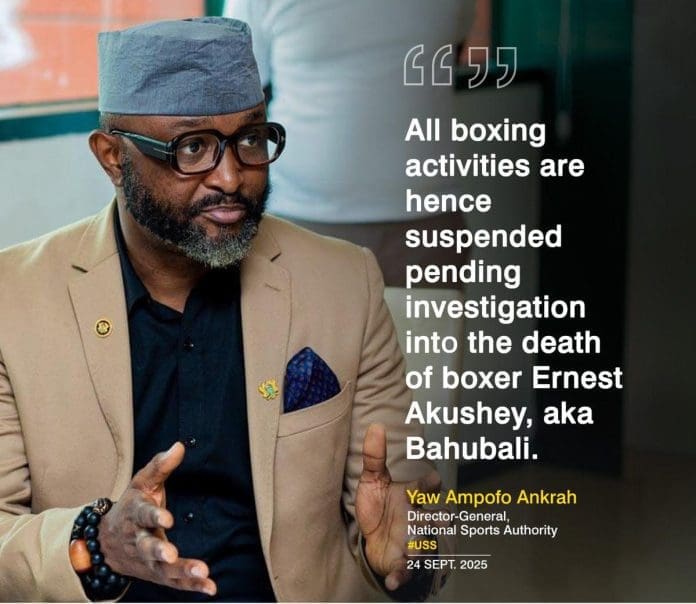National Sports Authority (NSA) Director General Yaw Ampofo Ankrah has clarified that medical experts, not sports administrators, will determine when Ghana’s boxing suspension is lifted following the tragic death of Ernest “Bahubali” Akushey.
Ankrah emphasized that the authority is relying entirely on professional medical clearance before making any decisions about resuming boxing activities in the country. The stance reflects growing recognition that ringside safety requires specialized medical expertise beyond the knowledge of sports journalists and administrators.
“Sports journalists and administrators are not medical experts and must therefore depend on the guidance of those who are,” Ankrah stated, describing the decision-making process as straightforward but dependent on professional medical advice.
The comments come just days after the NSA announced an immediate suspension of all boxing activities following Akushey’s death on September 23, 2025, at Korle-Bu Teaching Hospital. The 32-year-old boxer died from internal bleeding eleven days after taking heavy punishment during a bout against Jacob Dickson at Bukom Boxing Arena.
Ghana’s boxing community is still reeling from this second fatality in seven months, following the earlier death of Nigerian boxer Gabriel Oluwasegun Olanrewaju in March. The repeated tragedies have forced authorities to acknowledge systemic safety failures in the sport’s administration.
The NSA simultaneously dissolved the Ghana Boxing Authority (GBA) interim board on Friday, announcing plans to establish a new interim management committee. This dramatic restructuring signals the government’s determination to overhaul boxing governance completely rather than implement incremental reforms.
Ankrah’s emphasis on medical expertise reflects lessons learned from the March incident, where inadequate ringside medical protocols contributed to public outcry. The NSA appears determined to avoid similar criticism by ensuring that any resumption of boxing activities meets international medical safety standards.
The authority had been preparing to implement reforms recommended by an investigative committee following Olanrewaju’s death. However, Akushey’s passing just months later demonstrated that existing measures were insufficient to prevent further tragedies.
Video footage of Akushey’s bout against Dickson sparked widespread social media outrage, with critics describing the fight as dangerously one-sided. The public reaction highlighted growing awareness of boxing safety issues and increased pressure on authorities to take decisive action.
The Sports Ministry will inaugurate a new Boxing Interim Management Committee on Monday, September 30, at its conference room. This new body will presumably work alongside medical experts to develop comprehensive safety protocols before any resumption of activities.
Akushey, who maintained an impressive 6-0 professional record before his final bout, was considered one of Ghana’s promising boxing talents. His death has devastated the Chorkor community where he was a beloved figure, highlighting the human cost of inadequate safety measures.
The boxer’s twin sister, Naa Akweley, revealed heartbreaking details about his final days in interviews with local media, emphasizing how quickly his condition deteriorated after the September 12 fight. Her testimony added emotional weight to calls for comprehensive boxing reforms.
The NSA’s decision to prioritize medical expertise over administrative convenience represents a significant shift in approach. Previously, sports authorities often made decisions based on promotional considerations or economic pressures rather than medical evidence.
International boxing organizations, including the World Boxing Council (WBC), have mourned Akushey’s passing while calling attention to safety standards in developing boxing markets. The global response adds pressure on Ghana to demonstrate meaningful reforms.
Ankrah’s comments suggest the suspension could last considerably longer than initially anticipated if medical experts identify fundamental structural problems requiring comprehensive solutions. The authority appears prepared to accept extended delays rather than risk additional fatalities.
The emphasis on medical clearance aligns with international best practices where boxing commissions rely heavily on neurological assessments, cardiac evaluations, and other specialized medical protocols to ensure fighter safety.
Ghana’s boxing industry faces economic implications from the suspension, with promoters, trainers, and fighters losing income during the indefinite halt. However, Ankrah’s comments suggest these concerns remain secondary to safety considerations.
The NSA’s approach contrasts sharply with previous responses to boxing incidents, where administrative changes often preceded rather than followed comprehensive medical assessments. The reversal suggests authorities recognize the limitations of non-medical interventions.
Medical experts will likely conduct thorough reviews of ringside safety protocols, referee training standards, fighter health monitoring systems, and emergency response procedures before recommending any resumption of activities.
The timeline for boxing’s return remains uncertain, but Ankrah’s emphasis on expert guidance suggests the suspension will continue until medical professionals provide unequivocal clearance that safety standards meet international benchmarks.
For Ghana’s boxing community, the wait represents both frustration and hope – frustration over lost opportunities but hope that comprehensive reforms will prevent future tragedies and restore public confidence in the sport’s safety standards.
Source: newsghana.com.gh











